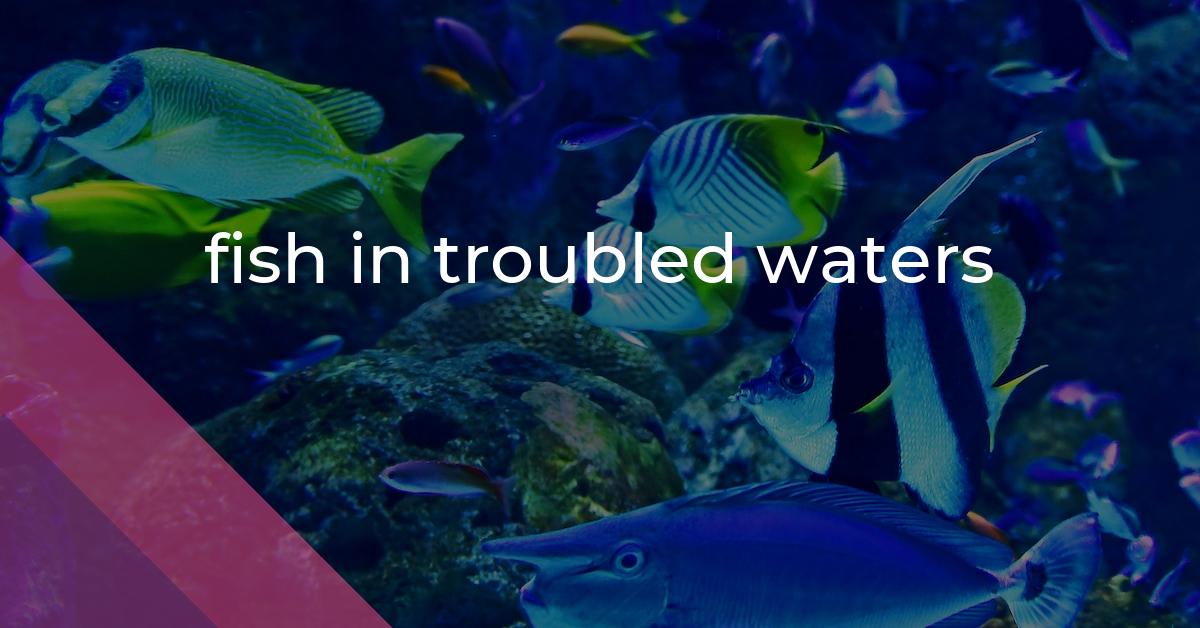fish in troubled waters: Idiom Meaning and Origin
What does ‘fish in troubled waters’ mean?
The idiom "fish in troubled waters" means to take advantage of a difficult or chaotic situation for personal gain or advantage.

Idiom Explorer
The idiom "kettle of fish" refers to a difficult or messy situation. It implies a situation that is full of complications, problems, or confusion.
The idiom "in too deep" means being heavily involved or committed to a situation or problem to an extent that it becomes difficult or impossible to escape or resolve it.
The idiom "in the swim" means to be actively involved or participating in something, typically referring to being part of the current trends, events, or activities. It suggests being well-informed and connected to what is happening around you.
The idiom "in the same boat" means being in a similar situation or facing the same difficulties as others.
The idiom *in the drink* means to be in a difficult or unpleasant situation, often caused by one's own actions or decisions. It originates from the idea of someone falling into water or a drink, representing a sudden and unexpected mishap or trouble.
The idiom "in for it" means to be in trouble or about to face negative consequences for one's actions or behavior.
The idiom "in at the deep end" means to be thrown into a difficult or challenging situation without any preparation or guidance.
The idiom "in a bind" means to be in a difficult or challenging situation where there are not many options or solutions available.
The idiom "hot water" refers to being in a difficult or troublesome situation, often due to one's own actions or decisions.
An idiom meaning a controversial issue or situation that is difficult to handle, and often passed quickly from person to person to avoid dealing with it.
Deciphering Turmoil
The idiom "fish in troubled waters" is commonly used in English to describe an individual or a group that takes advantage of a chaotic or difficult situation for its own benefit. This idiom has been in use for centuries and has evolved to convey a specific meaning in contemporary usage.
One interpretation of this idiom is that it refers to someone who thrives or benefits from a tumultuous or uncertain situation. The image of a fish thriving in turbid waters suggests that this individual is able to navigate and exploit chaos to their advantage. By capitalizing on the troubles of others, they are able to excel or gain an upper hand.
On the other hand, this idiom may also imply opportunism or unethical behavior. It alludes to a person who takes advantage of vulnerable or desperate circumstances, like a fish capitalizing on the weakened state of its prey. This darker perspective highlights the unsavory aspects of seizing opportunities amidst difficulties.
While the exact origin of the idiom remains elusive, it may have its roots in fishing metaphors, which were frequently used in literature and everyday language throughout history. The concept of fish seeking food in troubled or disturbed waters can be traced back as early as the 16th century. It is likely that this metaphorical expression gradually gained popularity, eventually solidifying into the idiom we know today.
By the late 17th century, the idiom "fish in troubled waters" was already well-established, as evidenced by its appearance in various literary works of that time. For instance, the English playwright William Congreve used the phrase in his play "Love for Love" (1695), indicating that it was already a widely recognized expression by this period.
Over time, the idiom has become ingrained in the English language, appearing in numerous publications and works of literature. Its metaphorical power and versatility have allowed it to persist and remain relevant in contemporary usage.
Despite its long history, the idiom's usage and interpretation continue to evolve. As is often the case with idioms, its meaning can vary depending on the context and the speaker's intent. It has become a versatile tool in literature, journalism, and everyday conversation, providing a concise way to convey complex ideas related to opportunism, adaptability, and survival.
One related idiom that shares a similar meaning is "chum in the water." This idiom refers to someone or something that attracts attention or interest, often with the intention of benefiting from the resulting chaos or competition. Just like a fisherman using chum to attract fish, someone who puts out chum in the water is trying to create a situation where they can thrive or gain an upper hand.
Another related idiom is "blood in the water." This idiom is often used to describe a situation where there is evidence of weakness or vulnerability, and others are quick to take advantage of it. Similar to a wounded fish in the water, someone who senses blood in the water sees an opportunity to capitalize on the misfortunes of others.
The idiom "fish in troubled waters" can also be connected to the phrase "deep water." This idiom is often used to describe a difficult or challenging situation. Just as a fish in deep water may struggle to swim, someone who finds themselves in deep water may face obstacles or difficulties. However, like the fish in troubled waters, they may also find opportunities for growth and success amidst the challenges.
The idiom "fish in troubled waters" has endured for centuries, weaving its way through literature, language, and human communication. Its enduring popularity and diverse interpretations highlight the inherent complexities of language and the richness of idiomatic expressions. The idiom encapsulates the human propensity to navigate and exploit chaos for personal gain, but it also serves as a reminder of the ethical implications of such behavior. As we continue to explore and dissect idioms, the idiom "fish in troubled waters" serves as a symbol of linguistic versatility and a testament to the depth and breadth of human expression.
Example usage
Examples of how the idiom "fish in troubled waters" can be used in a sentence:
- He decided to fish in troubled waters by targeting a competitor's dissatisfied customers.
- The politician's controversial statements were seen as an attempt to fish in troubled waters and gain the support of a specific group.
- During the company restructuring, some employees saw an opportunity to fish in troubled waters and take advantage of the chaos.
The idiom "fish in troubled waters" is often used figuratively to describe a situation where someone takes advantage of a difficult or unstable situation for their own benefit. It implies someone exploiting a crisis, conflict, or confusion to achieve their own goals. The negative connotation suggests opportunistic behavior and a lack of ethical consideration.
More "Misfortune" idioms



